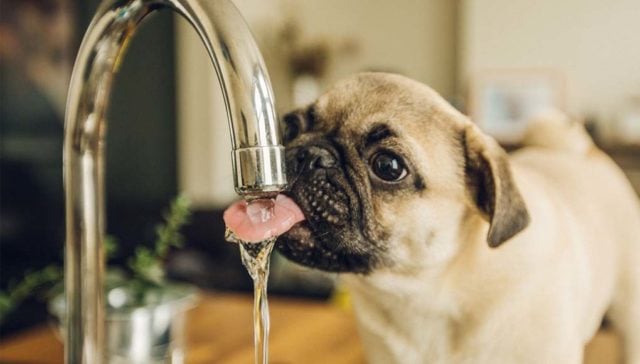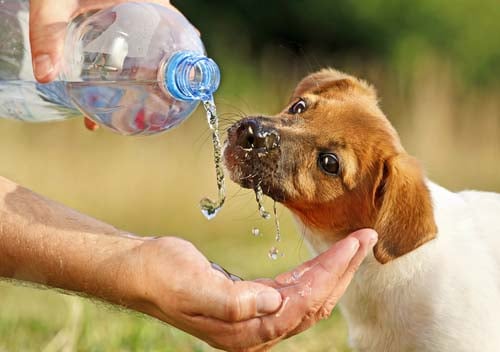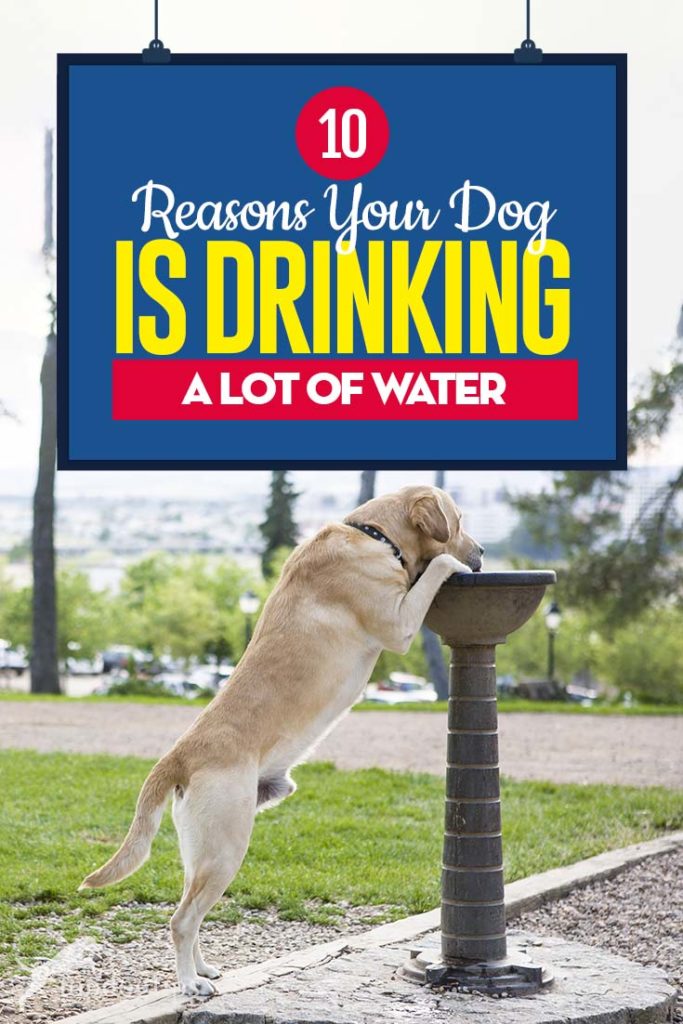
Table of Contents
- 14 Reasons a Dog Drinks a Lot of Water
- 1. Boredom or Breed
- 2. Cushing's Disease
- 3. Diabetes
- 4. Exercising A lot in Cold and Hot Weather
- 5. Liver Disease
- 6. Hypercalcemia (High calcium levels in the blood)
- 7. Kidney Failure and Chronic Kidney Disease
- 8. Medications
- 9. Pyometra
- 10. Psychogenic Polydipsia
- 11. Diabetes mellitus
- 12. Overly salty treats or high-sodium meals
- 13. Dehydration
- 14. Excessive Exercise
- Do's and Don't for a Dog Drinking a Lot of Water.
- FAQs
- Closing Thoughts
If you notice your dog drinking a lot of water, several reasons may cause this.
Approximate estimates of how much water a dog should drink without water intoxication, health maintenance, or need for exercise have been reported by the National Research Council (1).
However, currently, there is no consensus on what the optimal water intake for dogs would be (2).

It is generally recommended that a healthy dog's water intake is around 1/2 to 1 ounce of water per pound of body weight.
Due to there being no canine studies for accurate water consumption numbers, pet owners must consistently provide fresh drinking water for the dogs to drink whenever they're thirsty (3, 4).
Exercise will impact a dog's water consumption needs because dogs increasingly lose water through evaporative cooling (5, 6) and increased heart rate and panting (7).
Dogs will also drink more in winter, especially in frigid climates and when the temperature drops to around 21°F to –4°F or –6°C to −20°C (8, 9, 10).
For athletes and working dogs, particularly those in colder environments, other than providing fresh drinking water, studies show that nutrient/supplement-enhanced water benefits them even more (11, 12).
In this article, we will discuss excessive thirst in dogs and what the causes could be.
The causes will range from mild to a possible life-threatening condition.
We will also go over the Do's and Don'ts when your dog is drinking excessive amounts from their water bowl.
14 Reasons a Dog Drinks a Lot of Water
There are several different reasons your dog may be thirstier than usual.
Not all of them are medical issues, but you should monitor such changes in your dog's routine.
If you see heavy drinking continuing, call your veterinarian.
1. Boredom or Breed
Among water-loving dogs, drinking more water is relatively standard.
Some breeds with this tendency include Retrievers, Setters, Newfoundlands, Labradors, and Standard Poodles.
Also, young puppies will often amuse themselves by playing in all kinds of pools of water and drinking it.
2. Cushing's Disease
Cushing's Disease affects the dog's endocrine system, altering cortisol levels, a hormone that responds to stress.
Too much cortisol in a dog's design can be very damaging.
Thirst is one of the main symptoms of Cushing's Disease, along with increased hunger, obesity, hair loss, and muscle weakness.
3. Diabetes
Diabetes prevents your dog's body from converting sugars to energy, meaning the glucose levels in the blood increase.
Dogs with diabetes will often exhibit increased thirst.
Symptoms besides excessive water intake due to dehydration include extreme hunger and weight loss.
4. Exercising A lot in Cold and Hot Weather
Extreme weather changes will impact a dog's body water loss and, subsequently, water intake.
On top of that, active dogs drink more water than sedentary dogs.
Just like us, in hot weather, if your dog is more active, it can experience increased thirst when playing outside.
As long as there aren't other symptoms like excessive urination or a decrease in your dog's appetite.
They showed the same in dogs playing in icy environments since the body has to work harder to keep them warm, thus expanding more of the body's water reserves.
5. Liver Disease
Liver Disease and hepatitis will make a dog consume more water. It often has ties to aging in dogs, and there can also be genetic ties.
You may notice your dog's eyes turning yellow, their body appearing weak, signs of confusion, and increased thirst.
6. Hypercalcemia (High calcium levels in the blood)
When there is too much calcium in your dog's body, they become depressed and lethargic. They may also vomit or have trouble relieving themselves.
These are rather vague symptoms, along with excessive thirst and a dog drinking a lot of water. This is something that a vet typically discovers upon examination and blood tests.
7. Kidney Failure and Chronic Kidney Disease
When a dog's kidneys begin to fail, it affects their blood pressure and hormone production, among other things.
Unfortunately, by the time an owner sees the signs of kidney failure, it's often too late for effective treatment.
Dogs with kidney failure have increased thirst, weight loss, constipation, vomiting, and excessive.
Kidney disease is diagnosed with a trip to the vet with a blood and urine sample.
If caught early, kidney disease can be treated by adjusting their nutrition.
Sometimes, though, a dog will have severe kidney failure, where they need to be hospitalized and treated with intravenous fluid therapy.
8. Medications
Sometimes, your dog's medication, powerful ones like steroids, can cause excessive thirst..
So if your pup recently started a new medical regimen, you have a good starting point for a probable culprit.
When you notice these symptoms, call your vet and see if a change is recommended.
9. Pyometra
Pyometra is a condition that only occurs in unspayed female dogs. It's a disease that presents due to hormonal changes in the canine's uterus (at any age).
It comes on suddenly, sometimes seeming like what humans experience with appendicitis. Your dog will have some discharge from the vulva, notably after heat.
Other symptoms include drinking and peeing regularly and loss of appetite. Diagnosis requires X-rays, blood work, and ultrasound.
10. Psychogenic Polydipsia
Psychogenic Polydipsia is a behavioral condition manifesting as excessive water consumption.
This term applies to any signs of unusual thirst that have no physical reason. In effect, your dog is not sick. Some feel attention-seeking behavior (because you take the dog out every time the dog has to pee).
If no underlying conditions exist for a dog's excessive thirst, this is typically the diagnosis.
11. Diabetes mellitus
If your dog drinks more water than normal and is urinating frequently, it could be diabetes mellitus.
Diabetes is a disease that is caused by your dog's body not producing enough insulin to regulate high blood sugar.
In some cases, diabetes mellitus also happens when the body no longer responds to how much insulin is produced by the pancreas.
When there isn't insulin to regulate blood sugar, the sugar is then passed through the urine.
Increased urination is the body's response to get rid of excess glucose.
This usually results in urinary accidents around the house.
12. Overly salty treats or high-sodium meals
If your dog drinks more water than normal, think about what you've been feeding them.
Do you feed them some of your human food from the dinner table? Typically, these table scraps are high in sodium.
Sodium attracts water, and excess sodium is dangerous.
If there is too much sodium compared to water, there is an imbalance in electrolytes.
The kidneys try to rectify that by causing increased urine production.
13. Dehydration
Dehydration can be caused by a lack of access to food or excessive exercise.
Your dog will express extreme thirst and excessive panting, their gums will appear red, and their saliva will look thick.
14. Excessive Exercise
This is an easy one to factor out.
When a dog has been playing and running around outside for long periods, it definitely needs to drink water.
All that exercise will increase a dog's water intake.
Do's and Don't for a Dog Drinking a Lot of Water.
DO NOT ignore the fact that your dog is drinking a lot of water. Some underlying conditions causing extreme thirst can progress quickly and turn into a critical matter, such as water intoxication.
DO schedule an appointment with your veterinarian as soon as you can.
DO NOT restrict water access before you discuss the symptoms with your vet. This could make things worse.
DO make an effort to track when your dog is drinking and how much. This may reveal that your dog's food is the problem (for example, too much salt).
DO NOT panic. Many conditions that cause excessive water consumption in dogs have effective treatments available so they can live a healthy, happy, everyday life.
DO make sure your dog is adequately hydrated both during hot days and freezing days. When going for a walk, we recommend bringing water with you.
DO educate yourself. If you discover that your dog drinking a lot of water comes from a disease or illness, learn about it so you can discuss your options and questions with your vet more thoroughly.
FAQs
Do dogs drink more water when in pain?
No, if they are drinking excessively, then something else is going on. In fact, a dog that is in pain will usually drink less water.
What does it mean when senior dogs start drinking a lot of water and not eating?
When senior dogs pick up an excessive drinking urge in a short amount of time, it's not a good sign. For one, they could have developed diabetes mellitus or something worse.
Make sure to call your vet to have them test a urine sample with other tests and diagnose what really is going on.
Closing Thoughts
If your dog has an excessive thirst and is constantly drinking out of their water bowl, pay attention.
Excessive water drinking on its own might just be from dehydration.
However, it is urgent if your dog has any of the following symptoms:
- Throwing up
- Lethargic
- Blood in their urine
- increased urination
At that point, only veterinarian oversight will be able to diagnose the underlying cause.
READ NEXT: Water Intoxication in Dogs – What You Must Know [Infographic]
Want to share this?














